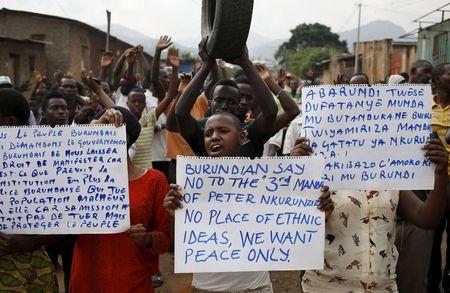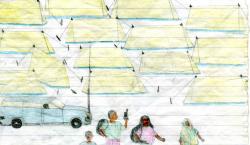Advertisement
Burundi tax revenues slide as unrest bites into businesses
BUJUMBURA (Reuters) - Burundi’s tax revenues fell in May compared to a year ago, the latest sign that the economy is seizing up after more than a month of unrest triggered by President Pierre Nkurunziza's bid for a third term, official data showed on Friday.
The poor African nation's semi-autonomous revenue board (OBR) said it collected 33.9 billion francs ($22 million) in May, a third less than the 49.9 billion francs targeted. It was also 17 percent lower than May 2014, it said.
Burundians complain of rising food prices and a shortage of dollars even on the black market where the currency has steadily weakened since protests erupted in the capital. Traders say they have few customers, particularly for imported goods.
“Since the outbreak of protests against the third term, economic activities are paralysed," said one OBR official.
"Imports, trade, banks’ activities are all affected by the crisis, and this has a direct negative impact on tax collection,” said the official, who asked not to be named.
The official central bank exchange rate for Burundi's franc is 1,548/1,573 to the dollar. But on the black market the currency has steadily fallen, trading at 1,950/2,000 this week.
Demonstrations flared on April 26, a day after Nkurunziza declared he would run again, a move demonstrators say violates the constitution's two-term limit. Nkurunziza cites a constitutional court ruling saying he can stand.
Burundi, dependent on aid and export revenues from tea and coffee, is facing its worst political crisis since an ethnically charged civil war ended in 2005. Activists say more than 30 people have been killed in the unrest, which has seen frequent clashes between armed police and stone-throwing protesters.
The International Monetary Fund has been pressing Burundi to boost tax revenues to support fragile government finances. The state depended on donors to fund roughly half its annual budget.
Tax revenues rose 21 percent to 166.5 billion francs in the three months to March from a year before, but dropped in April to 43.1 billion francs from 62.8 billion francs a year earlier, OBR figures showed.
Tensions had been building for weeks before protests flared at the end of April, depressing business activity, experts said.
OBR had predicted a tax revenue collection of 720.8 billion francs this year against 653.7 billion francs in 2014, expecting a higher collection and efforts to end corruption. That target will prove harder to meet the longer unrest continues.
OBR was set up in 2010 with the support of donors such as Britain and the World Bank to boost tax collection and transparency.
(Additional reporting by Patrick Nduwimana in Kigali; Writing by Edmund Blair)



















Add new comment